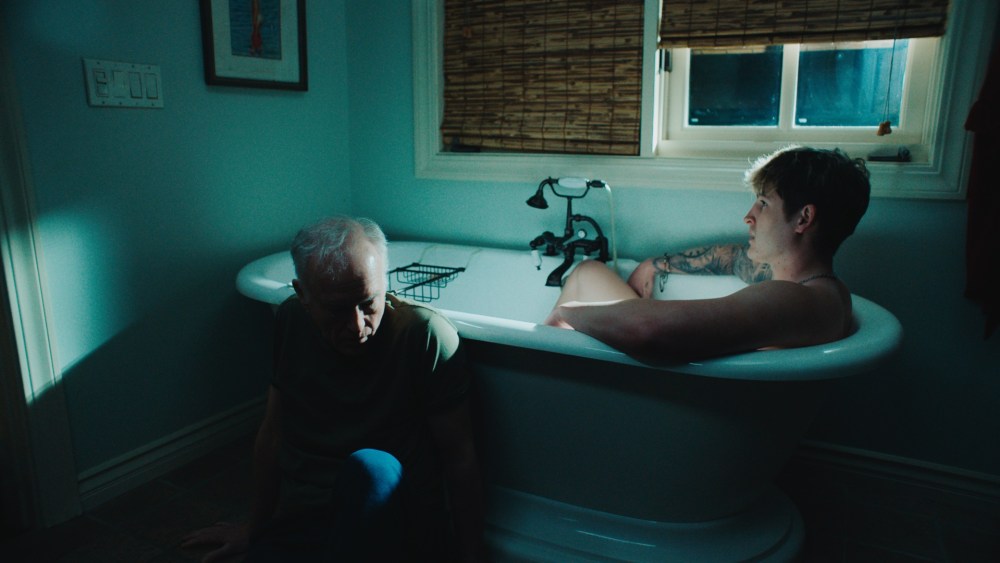Elliott Tuttle knew Blue Film, the story of a con man who reunites with a former high school teacher fired for sexually assaulting a student, would be divisive. After all, it paints a sympathetic portrait of a pedophile. But he thought some festival would have the courage to show this sensational drama. Instead, Tuttle received 10 straight rejections, including hard passes from indie venues like Sundance and SXSW.
“A lot of the feedback we got behind the scenes was that it was very polarizing and that people in power seemed to be afraid of this movie,” Tuttle said. “It was unbelievable to me. I believe in the quality of the films, but I also couldn’t believe that an American film festival would be so risk-averse.”
Salvation came from the Edinburgh International Film Festival, where the film premiered last summer to overwhelmingly positive reviews. Many critics praised Tuttle for sensitively handling such a provocative subject. The film will next be screened at NewFest on October 11th, with additional festival dates planned.
“I feel like it took a while for one festival to say, ‘No, it’s OK to program,’ and then a lot of other festivals to jump on board,” Tuttle said. “I still hope it will be distributed.”
Edinburgh critics also praised stage veteran Reid Birney, who played Hank Grant, a disgraced middle school teacher who becomes obsessed with former student Aaron Eagle (Kieron Moore), who grows up to be a fetish performer. Grant hires Aaron to spend the night with him. Although he is attracted to Aaron, he wants more than sex – forgiveness, understanding, connection, but everything becomes very vague.
“It was dark, but very well written,” Bernie says. “They were such great characters that I didn’t hesitate for a second. Then, when I saw it for the first time in Edinburgh in a packed room, I was embarrassed for the first time.”
Moore, who made his film debut in Blue Film, had a visceral reaction to the script.
“It was scary,” he says. “But what scared me the most was the idea of watching other actors do it. I felt like I had something worth showing.”
“Blue Film” was a bare-bones production. Shot on a low budget over 13 days in a house in LA’s Hancock Park neighborhood, the filmmakers moved quickly to get everything done on schedule. The days were long, and Bernie and especially Moore spent much of the day half-naked. But the most difficult part was the fiery exchange, in which the two actors share part of each other’s tormented souls.
“The character was more difficult for me than the intimacy,” Moore admits. “The intimate scenes felt like a nice break from some of the dialogue…But making this film made me ask myself what kind of actor I wanted to be and if I wanted to be a dangerous artist.”
Tuttle drew on his own childhood memories to craft a story that articulated the kind of dangerous art Moore wanted to continue making. When he came up with the idea for Blue Film, he had been watching a lot of films by Catherine Breillat, a French writer known for her edgy depictions of female sexuality.
“I remember when I was in middle school, I wanted my teacher to have sex with me. I really did,” he says. “I wrote a lot about that experience in my diary and thought about it retrospectively in later years, so it was kind of a natural assumption.”
Tuttle knew that the subject of pedophilia evoked passionate emotions, but he was struck by how “Perversion Park,” a 2014 documentary about Florida’s convicted sex offender community, compassionately explored the lives and inner struggles of its subjects. He wanted to do something similar with “Blue Film.” But while Tuttle and Barney know that Hank is resourceful, insightful, and wracked with guilt over his deviant desires, they also know that many will criticize them for portraying pedophiles as people rather than monsters.
“I have empathy for everyone. That’s how I live my life,” Tuttle says.
“No one chooses to be a pedophile,” Barney says. However, he insisted that Tuttle make it clear that Hank was not a predator.
“He doesn’t have a computer full of child pornography, and he hasn’t rounded up kids,” Barney says. “There’s a line in there that says, ‘I know it’s wrong. I always knew it was wrong.'”
Hank’s self-awareness may not be enough to convince skeptical viewers to watch “Blue Film” with an open mind. At one of the final screenings in Edinburgh, some audience members made it clear that this was not the emotional journey they had hoped for.
“I was sitting in the dressing room with my mom,” Tuttle says. “And one of our producers was there watching the movie, and about halfway through he texted me, ‘Oh, there’s a strike…and another strike…and another strike…and another strike.’ But the Q&A was lively too, and there were a lot of hands raised. So to me, it still felt like a good screening.”

